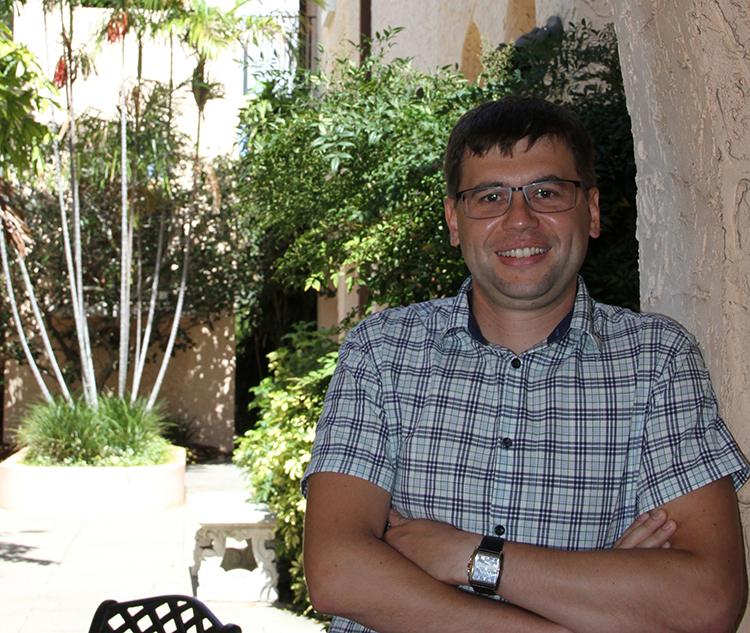Visiting professor from Ukraine returns to teach comparative criminal law
By Kai Su
Professor Dmitriy Kamensky from Ukraine has returned to Stetson University College of Law as a visiting professor this summer to teach a course on the Introduction to Comparative Criminal Law. The one-credit course, which runs for two weeks, compares the criminal law frameworks of America to the codified criminal law systems of Europe—mainly Ukraine and Germany.
Kamensky, who teaches at Berdyansk State University Law School in Ukraine, first came to Stetson as a Fulbright Visiting Student Researcher in 2015. He did comparative research on white collar crime under the mentorship of Professor Ellen Podgor, publishing two articles in the Stetson Law Review and the Mississippi College Law Journal. Kamensky said he had read numerous academic works by Podgor while in Ukraine, which is why he asked to be placed at Stetson.
“I think she’s one of the best experts in the field, so I asked if it might be possible for the Fulbright Program to place me here to work with her, and my request was granted.” Kamensky said. “So I was really excited about the amazing opportunity to work together.”
Kamensky is currently writing a treatise in which he compares the white collar crime framework in Ukraine and the United States. In Ukraine he teaches criminal law, criminal procedure, and criminology. However, he said teaching in America is much different than in Europe, where the Socratic method is uncommon.
“Here you have to have this legal communication with students going back and forth all the time. So that was a little bit of a challenge for me,” Kamensky said, “but I think so far so good—I am teaching and learning how to teach better at the same time.”
Kamensky said he learns a lot from his ten J.D. and LL.M. students, who he admits do an amazing job briefing him on the international news every day. He thinks it is great his students take an interest in international issues because it keeps their personal and professional horizons open.
“They might end up in a big law firm that has offices in Hong Kong or Moscow or Kiev,” Kamensky said. “They can travel all over the world, and that’s where these comparative international law skills become handy.”
The main white collar crimes in Ukraine are those associated with oligarchs and corruption within the government, which arise in a continuing attempt to control national welfare and the economy. Other areas of similar criminality include money laundering, tax evasion, and antitrust violations.
Kamensky explained that there has been major organized crime in Ukraine in the 1990s, which evolved into organized economic criminality in the 21st century.
“You no longer see gangsters with guns or blackmail or kidnapping, but instead the monetary schemes have taken place in organized crime,” Kamensky said, “and today millions of dollars are involved in corruption, connecting big businessmen to dishonest politicians.”
Kamensky said he believes this is the biggest threat for Ukraine right now.
“The question of the day is how we can get rid of such illegal practices and create a model for a fair distribution of welfare among our citizens—just like you see in this country and Australia, throughout Western Europe and other civilized countries,” Kamensky said. “We would like to see our own middle class growing, but until we destroy this oligarchy and its political ties, our successes here will remain very limited.”
Kamensky says many statutory crimes in America look similar to those in Ukraine. However, there are differences in the level of economic development, the role that law enforcement agencies play, and interpretation of criminal statutes by the judiciaries.
Kamensky has traveled extensively for the last several years, doing comparative research projects in Europe. This is his fourth professional visit to America, and he hopes not his last. He said there is currently a growing trend in Ukraine called international academic mobility, of which he is a big proponent.
“This is both international law and comparative law in action,” Kamensky said, “when there are amazing opportunities for academics, practitioners, and students to travel abroad with the goal of learning and sharing.”
Post date: June 23, 2017
Media contact: Kate Bradshaw
[email protected] | 727-430-1580
